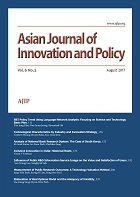Interview with a Korean Entrepreneur: Dr., CEO, Daeje Chin
서상혁 (호서대학교)
Abstract
Asian Journal of Innovation and Policy (AJIP) would like to introduce an interview section on innovations, innovators, and entrepreneurs if possible in every issue. The interviews introduced will be selected not based on a journalistic view, but rather by its theoretical or practical implications. This issue will introduce an entrepreneur who was a key engineer, Chief Technology Officer (CTO), and CEO of Samsung Electronics, in addition to being the Minister of ICT in the Korean government. Currently, he is the CEO of an investment company. His success was tied to the success of semiconductors at Samsung Electronics, which became the world leader, leading some to even call him “the god of semiconductors”. This interview resurrects the debates on the mode 2 society and the role of education in entrepreneurship.
- keywords
- Entrepreneur, creativity, mode 2 society, role of education, role of government
참고문헌
Chin, D. (2007) Manage Your Passion, Seoul: Kimyoungsa. (in Korean)
Blanchflower, D. and Oswald, A.J. (1990) What makes an entrepreneur? Evidence on inheritance and capital constraints, NBER Working Paper No. 3252.
Casson, M. (1982) The Entrepreneur: An Economic Theory, New Jersey: Barnes & Noble Books.
Carland, H., Hoy, F. and Carland, J.W. (1988) Who is an entrepreneur? is a question worth asking, American Journal of Small Business, 12(4), 33-39.
Etzkowitz, H. and Leydesdorff, L. (2000) The dynamics of innovation: from national systems and “Mode 2” to a Triple Helix of university-industry-government relations, Research Policy, 29(2), 109-123.
Gibbons, M. et al. (1994) The New Production of Knowledge: The Dynamics of Science and Research in Contemporary Societies, London: Sage.
Godin, B. and Gingras, Y. (2000) The place of universities in the system of knowledge production, Research Policy, 29(2), 273-278.
Krueger, N.F. (1988) Entrepreneurship: Critical Perspectives on Business and Management, London: Routledge.
Nowotny, H., Scott, P. and Gibbons, M. (2003) `Mode 2' revisited: the new production of knowledge, Minerva, 41(3), 179-194.
Pavitt, K. (2000) Academic Research in Europe, Science Policy Research Unit.
Schumpeter, J.A (1934) The Theory of Economic Development: An Inquiry into Profits, Capital, Credit, Interest, and the Business Cycle. English Version (1983) by Transaction Publishers.
Van Aken, J.E. (2005) Management research as a design science: articulating the research products of mode 2 knowledge production in management, British journal of management, 16(1), 19-36.
- 다운로드 수
- 조회수
- 0KCI 피인용수
- 0WOS 피인용수


